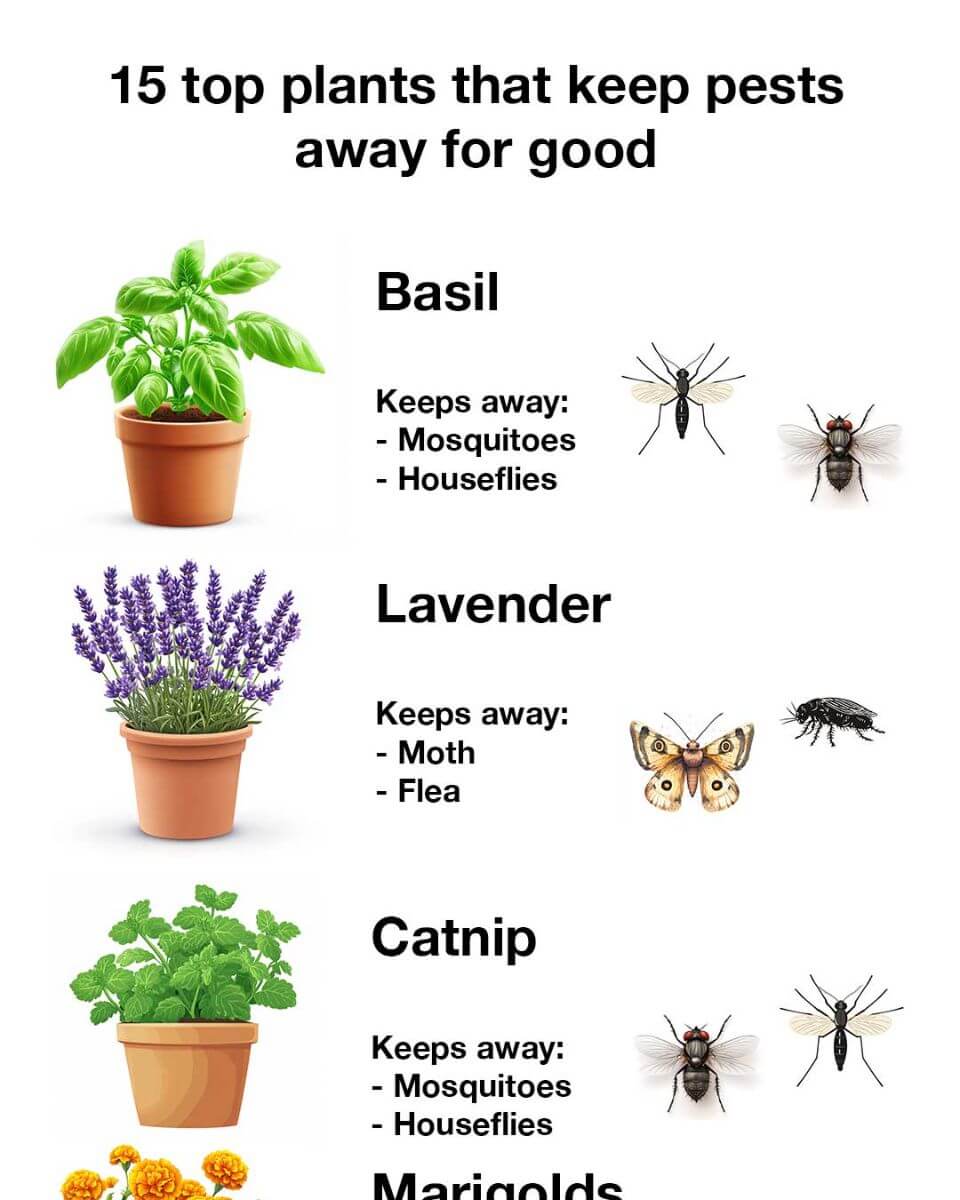Gardeners and homeowners are always searching for natural ways to protect their outdoor spaces from pests. While chemical pesticides can be effective, they often have negative environmental impacts and potential health risks. Thankfully, nature offers an alternative—certain plants naturally repel insects while adding beauty and fragrance to your garden.
This guide highlights 15 plants known for their ability to deter pests, helping you maintain a thriving, pest-free environment without relying on chemicals.
How Plants Naturally Repel Pests
Many plants have developed their own defense mechanisms to ward off unwanted insects. Some release strong scents that confuse or deter pests, while others produce natural oils or compounds that insects find toxic. Additionally, some plants attract beneficial insects that prey on harmful pests, helping to maintain balance in the garden ecosystem. By understanding these natural properties, you can strategically place these plants in your garden to maximize their pest-repelling benefits.
1. Basil – A Natural Repellent for Mosquitoes and Houseflies
Basil is not only a staple in the kitchen but also a great natural pest deterrent. Its strong aroma helps keep mosquitoes and houseflies at bay. Planting basil near entryways, windows, or outdoor seating areas can prevent these pests from invading your space. You can also use basil in homemade insect-repellent sprays for added protection.
2. Lavender – A Fragrant Barrier Against Moths and Fleas
Lavender’s pleasant scent is loved by many, but moths and fleas dislike it. Keeping dried lavender sachets in closets can protect clothes from moth damage, while planting lavender in your garden can help keep fleas and other insects away.
3. Catnip – Surprisingly Effective Against Mosquitoes and Houseflies
While catnip is well known for its effect on felines, it’s also an incredibly powerful mosquito and housefly repellent. Research suggests that catnip oil is more effective than some commercial insect repellents. Growing catnip in your garden can help reduce these pesky insects.
4. Marigolds – A Vibrant Defense Against Aphids and Mosquitoes
Marigolds bring bright color to your garden while serving as a natural insect repellent. These flowers release a scent that repels aphids, mosquitoes, and even nematodes, making them a great companion plant for vegetable gardens.
5. Rosemary – Keeping Mosquitoes and Cabbage Moths Away
This versatile herb isn’t just for cooking—it’s also an excellent natural repellent. Rosemary’s woody aroma deters mosquitoes and cabbage moths. Whether planted in the garden or in pots, it provides a fragrant and effective barrier against these pests.
6. Peppermint – A Natural Solution for Ants and Spiders
Peppermint has a refreshing scent that insects like ants and spiders find overwhelming. Planting it around the home or using peppermint oil in sprays can help keep these unwelcome visitors out.
7. Chrysanthemums – A Natural Insecticide for Roaches and Fleas
Chrysanthemums contain pyrethrum, a natural compound used in insecticides. These flowers are effective against roaches, fleas, and other bugs. You can plant chrysanthemums in your garden or use their flowers to make homemade insecticidal sprays.
8. Lemongrass – A Citrus-Scented Mosquito Repellent
Lemongrass is rich in citronella, a well-known natural mosquito repellent. Growing lemongrass in your garden or using its essential oil can help create a mosquito-free outdoor space.
9. Sage – Keeping Cabbage Moths and Carrot Flies at Bay
Sage is a strongly scented herb that confuses cabbage moths and carrot flies, preventing them from targeting crops. Planting sage near vegetables provides protection against these pests.
10. Petunias – An Attractive Defense Against Aphids and Tomato Hornworms
These colorful flowers do more than beautify your garden—they also deter aphids, tomato hornworms, and other insects. Their natural compounds make them an excellent companion plant for vegetable gardens.
11. Garlic – A Strong Deterrent for Mosquitoes and Beetles
Garlic’s potent aroma keeps mosquitoes, beetles, and various other pests away. Growing garlic in your garden creates a natural insect barrier, and garlic-based sprays can provide additional protection.
12. Citronella – The Classic Mosquito-Repelling Plant
Citronella is one of the most well-known mosquito repellents. Its essential oil is commonly used in candles and sprays. Growing citronella plants in pots or garden beds can help minimize mosquito activity in outdoor areas.
13. Mint – A Versatile Pest-Repelling Herb
Mint effectively repels ants, mosquitoes, and other insects by confusing their scent receptors. Since mint spreads rapidly, planting it in containers helps keep it under control while still benefiting from its pest-deterring properties.
14. Nasturtiums – A Natural Trap for Aphids and Whiteflies
Nasturtiums act as a trap crop, luring aphids and whiteflies away from other plants. By planting nasturtiums around the edges of your garden, you can help protect more valuable crops from pest infestations.
15. Eucalyptus – An Effective Repellent for Mosquitoes and Flies
Eucalyptus trees produce a strong scent that deters mosquitoes and flies. Their oil is often used in insect-repelling products. Planting eucalyptus in your garden helps create a natural protective barrier against these pests.
Conclusion: Using Plants to Maintain a Pest-Free Garden
Incorporating pest-repelling plants into your garden is a simple and eco-friendly way to control insects naturally. By strategically placing these plants, you can minimize the need for chemical pesticides while promoting a balanced garden ecosystem. Whether you’re looking to safeguard your vegetable garden or just enjoy a bug-free outdoor space, these plants provide a natural, effective solution.
